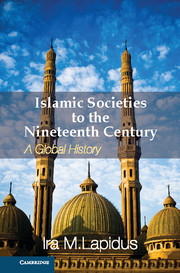Book contents
- Frontmatter
- Contents
- List of Illustrations
- List of Figures
- List of Maps
- List of Tables
- Preface
- Acknowledgments
- Acknowledgments to the first edition of A History of Islamic Societies
- Acknowledgments to the second edition of A History of Islamic Societies
- Publisher's Preface
- Introduction to Islamic Societies
- Part I The Beginnings of Islamic Civilizations
- Part II From Islamic Community to Islamic Society
- Egypt, Iraq, and Iran, 945–C. 1500
- Chapter 20 The Post-ʿAbbasid Middle Eastern State System
- Chapter 21 Muslim Communities and Middle Eastern Societies: 1000–1500 CE
- Chapter 22 The Collective Ideal
- Chapter 23 The Personal Ethic
- Chapter 24 Conclusion: Middle Eastern Islamic Patterns
- Part III The Global Expansion of Islam from the Seventh to the Nineteenth Centuries
- Glossary
- Bibliography
- Annotated Bibliography from A History of Islamic Societies, 2nd Edition
- Index
- References
Chapter 23 - The Personal Ethic
Published online by Cambridge University Press: 05 February 2013
- Frontmatter
- Contents
- List of Illustrations
- List of Figures
- List of Maps
- List of Tables
- Preface
- Acknowledgments
- Acknowledgments to the first edition of A History of Islamic Societies
- Acknowledgments to the second edition of A History of Islamic Societies
- Publisher's Preface
- Introduction to Islamic Societies
- Part I The Beginnings of Islamic Civilizations
- Part II From Islamic Community to Islamic Society
- Egypt, Iraq, and Iran, 945–C. 1500
- Chapter 20 The Post-ʿAbbasid Middle Eastern State System
- Chapter 21 Muslim Communities and Middle Eastern Societies: 1000–1500 CE
- Chapter 22 The Collective Ideal
- Chapter 23 The Personal Ethic
- Chapter 24 Conclusion: Middle Eastern Islamic Patterns
- Part III The Global Expansion of Islam from the Seventh to the Nineteenth Centuries
- Glossary
- Bibliography
- Annotated Bibliography from A History of Islamic Societies, 2nd Edition
- Index
- References
Summary
The consolidation of a post-imperial Islamic society was accompanied by the consolidation of Islamic religious literatures, beliefs, and values and by the canonization of an Islamic ortho doxy. Although the basic literatures of exegesis, hadith, law, theology, and mysticism had originated in an earlier era, during the tenth to the thirteenth centuries these literatures were merged into the forms that we now identify as “classical Islam.” A Sunni-scripturalist-Sufi orientation became the most commonly accepted version of Islam. Shiʿism, philosophy, theosophy, and popular religion were the alternatives to the Sunni consensus. The post-imperial era constructed both the normative forms of Islamic religious belief and practice and the alternatives, thus defining the issues that would ever after constitute the problématique of Muslim religious discourse.
Normative Islam: Scripture, Sufism, and Theology
Sunni consensus became grounded in scripture during the medieval period. In the post-imperial era, the Quran was understood to require each person to do the good deeds commanded by God; to be moderate, humble, kind, and just; and to be steadfast and tranquil in the face of his own passions. The true Muslim is the slave of God. He accepts his humble place in the world and takes no pride or consolation in human prowess but recognizes the limited worth of all worldly things and the greater importance of pleasing God.
- Type
- Chapter
- Information
- Islamic Societies to the Nineteenth CenturyA Global History, pp. 302 - 329Publisher: Cambridge University PressPrint publication year: 2012



